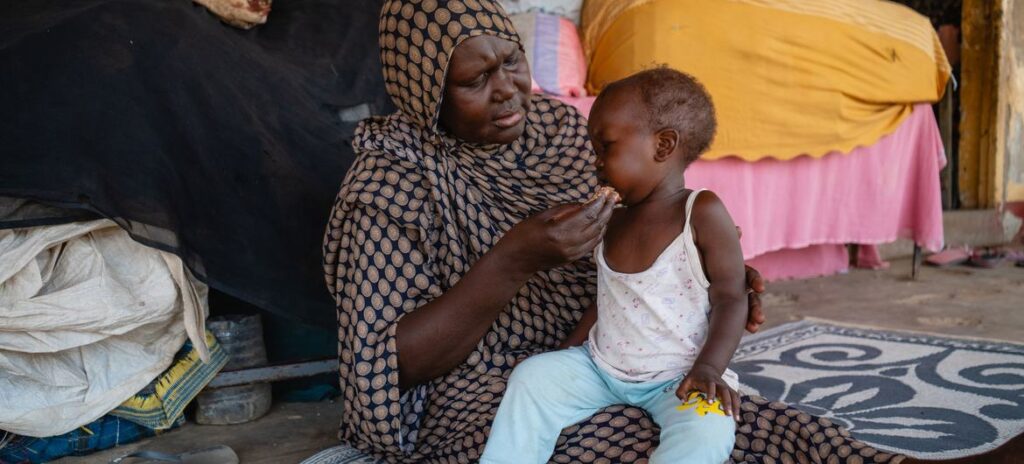“The Secretary-General strongly condemns the attack reportedly carried out by the Rapid Support Forces (RSF) in Wad Al-Noura village, Jazira State, on June 5, which reportedly killed more than 100 people,” said his spokesperson in a statement. overnight statement, that too underlined “the immense suffering of the Sudanese people as a result of the ongoing hostilities”.
“It is high time for all parties to silence their guns across Sudan and commit to a path there lasting peace for the Sudanese people.”
Briefing of journalists in Geneva from Port Sudan, Mohamed Refaat, the UN migration agency (IOMThe head of the country’s mission in the country on Wednesday highlighted “truly horrific reports of violent attacks and casualties” in the village of Wad Al-Noura in Aj Jazirah state.
His comments came as unconfirmed video footage showed dozens of bodies buried in the village after a reported attack by heavily armed RSF fighters, some 112 kilometers (70 miles) from the capital.
At least 35 children are said to be among the deaddrawing strong condemnation of the UN Children’s Fund (UNICEF) Executive Director Catherine Russell.
“This is yet another stark reminder of how Sudan’s children are paying the price for brutal violence,” she said in a statement late Thursday. “Thousands of children have been killed and injured in the past year. Children have been recruited, kidnapped and subjected to rape and other forms of sexual violence. More than five million children have been driven from their homes.
The UN’s top human rights official also expressed shock upon learning of the killings in Wad Al-Noura, claiming that the RSF “used weapons during the attack that affected a wide area, including artillery shells.”
“These killings add to my existing serious concerns about compliance with the principles of distinction, proportionality and precaution under international humanitarian law by those involved in the fighting,” said Volker Türk, UN High Commissioner for Human Rights . “Those responsible for unlawful killings must be held accountable. How many more Sudanese civilians must die before the parties to the conflict stop the fighting?
Darfur’s flashpoint
At another flashpoint of the conflict, in North Darfur’s capital El Fasher in western Sudan, some 800,000 civilians remain at risk amid heavy fighting between the Sudanese Armed Forces (SAF) and the rival RSF.
The location remains “inaccessible” to the UN, both cross-border and cross-bordersaid Mr Refaat.
He called on all parties to facilitate unhindered access to the area “through all available routes” and stressed that water and fuel prices there have “skyrocketed”, making essentials unaffordable.
Internal displacement in Sudan has almost reached 10 million people since the start of the conflict on April 15 last year, IOM’s Mr Refaat noted, with food insecurity an increasing factor in people’s decision to flee. About 18 million people in the country are acutely hungry, while 3.6 million children are acutely malnourished.

© UNICEF/Mohamed Zakaria
Refugees stranded
In addition to the internally displaced persons, more than two million people have fled across Sudan’s borders to neighboring countries, mainly Chad, South Sudan and Egypt, “who often arrive in extremely vulnerable conditions and very traumatized,” Mr. Refaat emphasized.
The IOM spokesperson also warned of a threefold increase that IOM recorded last year in the number of Sudanese taking “dangerous, irregular migration corridors to Libya and Tunisia, and then on to Europe.” He cited “unconfirmed reports” from about 2,000 families currently “stranded in difficult conditions, including migrants between the borders between Egypt, Libya and Sudan.”
Chadian solidarity for the most traumatized
Following his comments, Alpha Seydi Ba, the UN refugee agency (UNHCRThe regional spokesperson for West and Central Africa spoke of the devastating situation in Chad, where more than 600,000 Sudanese have arrived since the start of the crisis. “You have seen dozens of people coming every day in a very, very bad condition, and most of them are women, children who have an unimaginable, unimaginable trauma,” he said.
Chad has already hosted more than 400,000 Sudanese refugees before this crisis, Mr Ba explained, before expressing the UN agency’s appreciation that authorities have “kept their borders open”.
But responding to refugees’ basic needs, such as shelter, food, access to children’s education and psychological support, has become increasingly difficult due to funding shortfalls.
UNHCR said the response plan for five neighboring countries hosting refugees from Sudan, totaling $1.4 billion, only nine percent funded. The humanitarian The response in Sudan remains only 16 percent funded.
Healthcare collapse
Meanwhile, the UN health agency WHO raised the alarm about the poor healthcare situation in the country, warning that it was “collapsed”.
WHO spokesman Christian Lindmeier told journalists in Geneva that about 65 percent of the population now has no access to care. “Health care in Sudan has tended to be heavily dependent on Khartoum, where the health care system had been decimated,” he explained.
“Only about 25 percent of the needed medical supplies are available in the country. In hard-to-reach areas, only 20 to 30 percent of healthcare facilities remain functional, yet at a minimal level.”
Measles threat
The WHO spokesperson warned of record numbers of measles cases in 2023 as vaccination rates fell due to the conflict.
“Unfortunately, we expect 2024 to be even worse,” he added.
The WHO said cholera, malaria and dengue are also on the rise and expressed concern about the lack of treatment for people suffering from chronic conditions such as diabetes, hypertension, heart disease and kidney failure.







